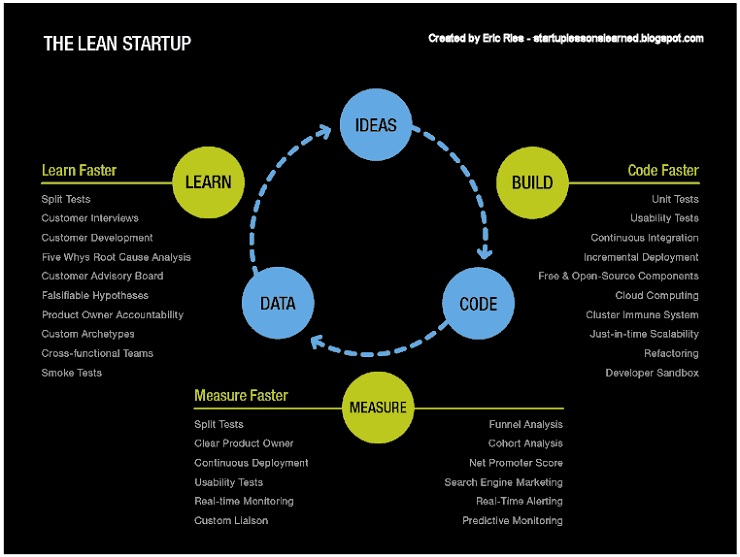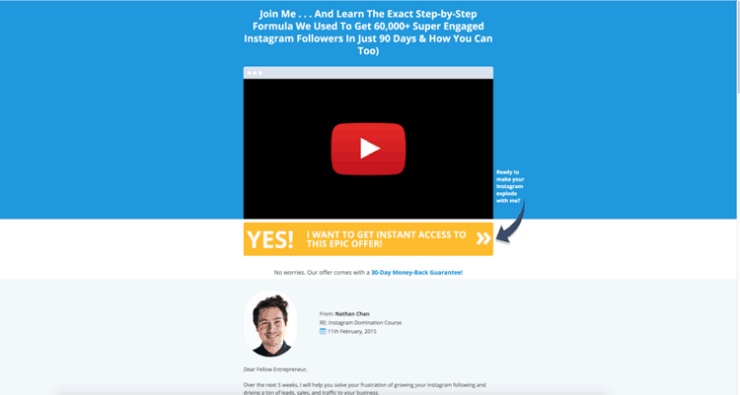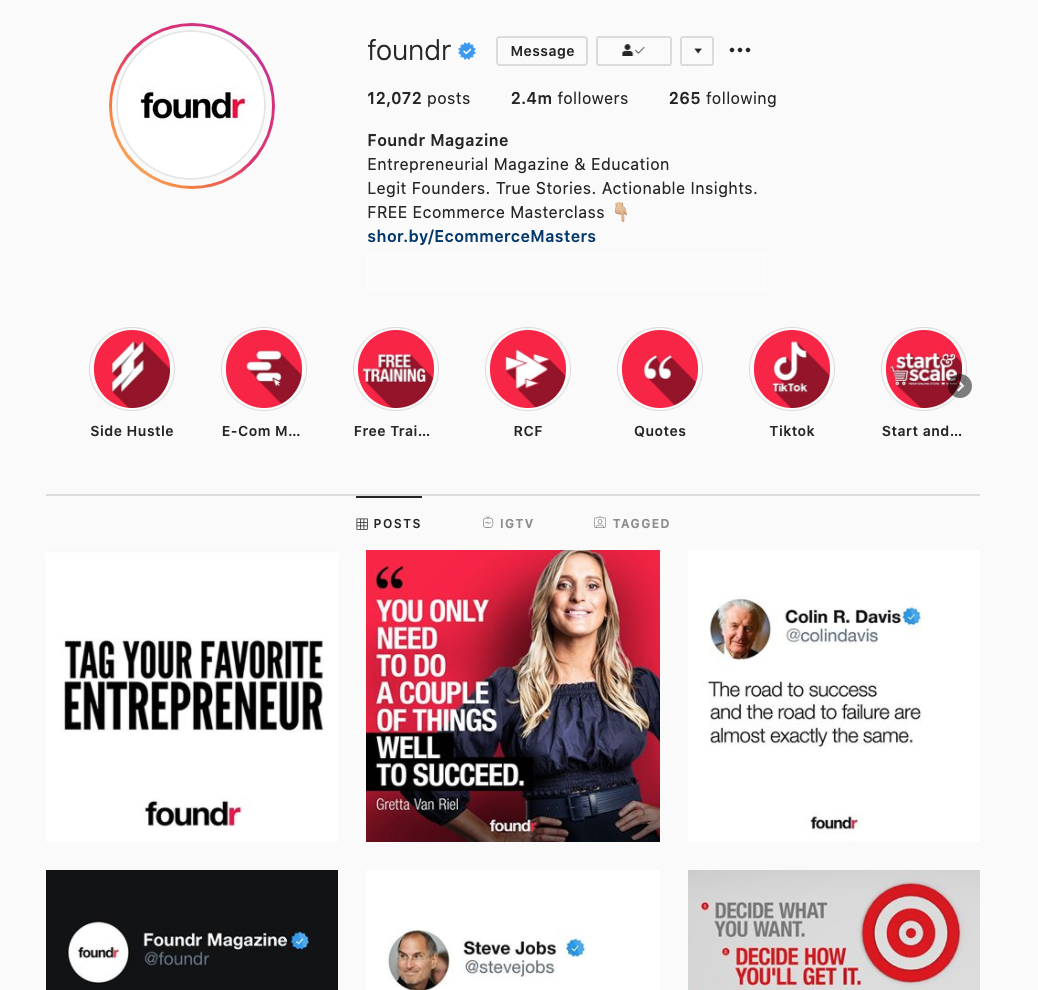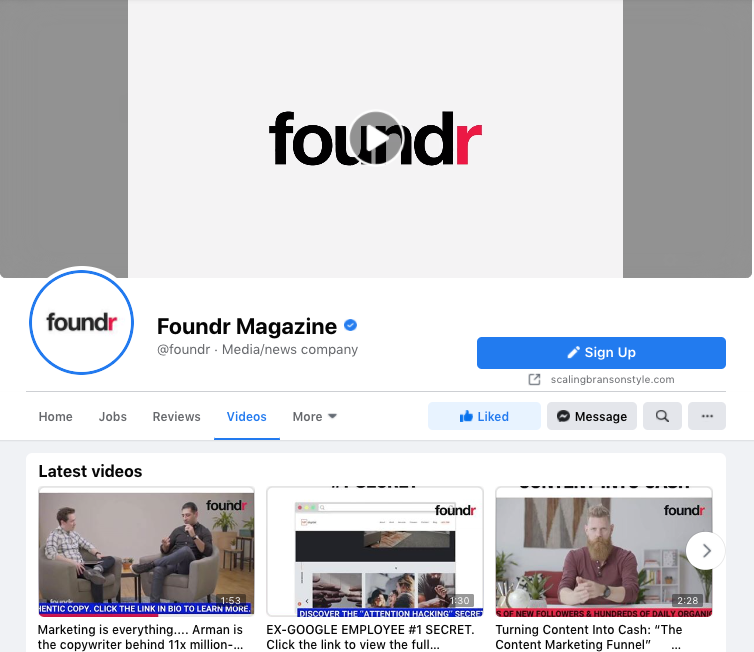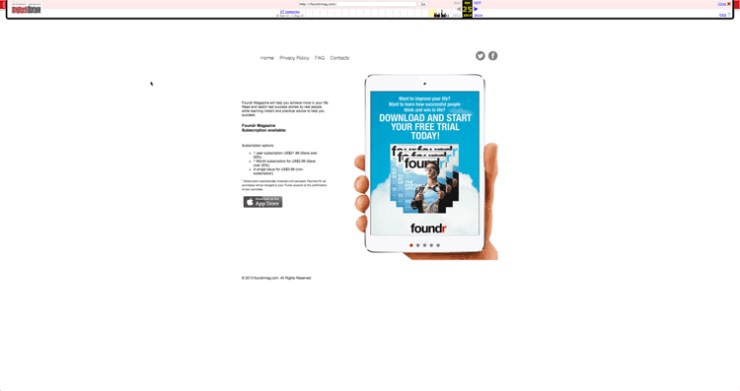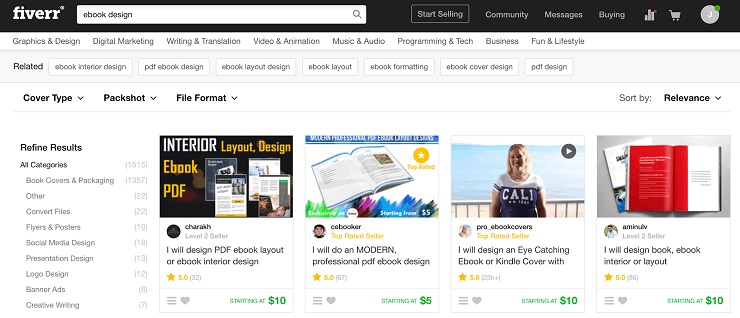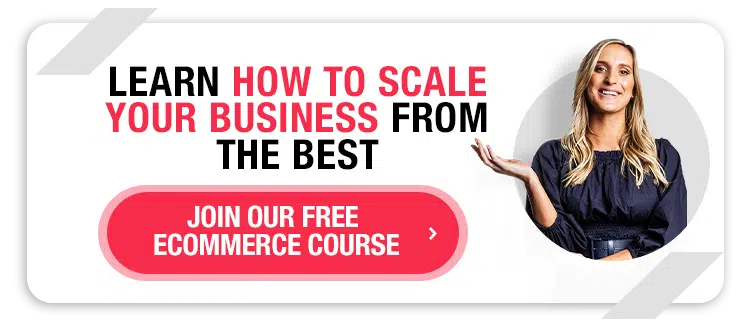
Limited time offer! You can join foundr+ with easy, low monthly payments.
Foundr
A magazine for young entrepreneurs
Categories
Written by | March 23, 2022
Want a heads up when a new story drops? Subscribe here
In the late 1960s, Richard Branson was a teenager with a nose for entrepreneurship.
He made an office out of his high school phone booth, and he didn’t even have the money to use the phone.
But he managed to sell a necklace for $200, and with that $200, Branson finally had the money to call potential advertisers for his fledgling magazine. The rest, as they say, is history. That $200 would eventually grow into the Virgin Group, now a multibillion-dollar brand, operating in industries ranging from aerospace to communications.
With $200 and his wits, Branson started an empire. That got me thinking—with all the technology within entrepreneurs’ grasps, what’s the minimum you’d need these days, realistically, to start an online business?
The answer we came up with: $127.
The reason this is possible is that there has never been a better time in history to be an entrepreneur. We firmly believe that anyone can start a business today, as long as you have an idea and the hustle.
Starting a business online these days is also surprisingly cheap. If you’re dying to get out there and start making money online, but you think that surely you’ll need thousands in the bank first, we’re about to prove you wrong.
Now, is $127 all you need to build a massive conglomerate right away? Probably not. And some of these price tags are going to vary, depending on the type of business you’re looking to get into.
But with $127 or less, you can get the ball rolling.
With $127 or less, you can get the idea out of your head and into the real world.
With $127 or less, you can start your entrepreneurial journey.
Here’s how to start an online business with $127 or less.
Read More: 4 Online Business Ideas to Consider During a Pandemic
The great thing about coming up with a million-dollar idea is that it’s completely free.
In fact, ideas themselves are dirt cheap, and whether you have a million of them or only one, all you really need is a pen and piece of paper in order to start working on your business idea.
Take a look at what problems you’re facing right now in your life, whether it’s something that annoys you a little bit, or something that can potentially uproot your entire day. See if you can find a solution to that problem, if you’re experiencing this issue, you can be pretty sure there are others out there who are going through the same thing.
All in all, if you can create a solution to a problem, then you have a profitable business idea right there.
With nothing but a pen and paper, you can start understanding what your business is all about, how much money you can potentially make, and what you need to do to make it a success.
OK, so technically you have to buy a pen and paper, but maybe you can steal some from your day job’s supply cabinet. Your secret’s safe with me.
Read More: 100 of the Best Side Hustle Ideas and Jobs
Once you’ve got an idea, it’s time to start spending a little of that $127 and see whether or not your idea is actually worth something or if it’s a dud.
You’re going to want to create a minimum viable product or MVP, and use it to validate your idea.
A common mistake that many people make when it comes to validating their business idea is that they’ll need to invest hundreds or thousands of dollars developing an MVP. You actually want to spend very little at this stage.
Whatever your idea of an MVP is, it can actually be even more on the minimum side, and can often be covered by the cash balled up in your pocket.
That isn’t to say that you won’t be building more MVPs as you go, after all an MVP is a process that you’ll be repeating over and over again as you grow.
But for starters, the two most cost-effective validation techniques, which also happen to be the most effective, is to either build a website or do the coffee shop test.
For the former, do a smoke test by building a simple landing page advertising your product and what it’s all about. You don’t need a ton of bells and whistles; all you need to know is whether or not people will actually pay money for it.
With $10 a month, you can set up a simple website (more on this a little later) and all you have to do is see how many people are interested in what you have to offer.
Just take a look at the landing page we did for Instagram Domination.
Nothing fancy, just a simple video explaining what we had planned for Instagram Domination and a button for people to click on if they were interested. Simple validation.
But my personal favorite validation method for under $10 is to do the coffee shop test.
Just head out to your local cafe, set up a small sign saying that in exchange for a coffee all you need is 10 minutes of someone’s time, and spend the whole day talking to people. All you really need are some concept photos, even a simple slideshow, and then talk to as many people as you’d like to gather valuable information.
You can find out what they like about your product, what they don’t like, how much they’d pay for it, and tons of other great info. It’s an insanely cheap and easy method to validate an idea.
If you happen to have a little more room in your budget and you’d like to splurge, offer them a muffin too.
Read More: 5 Low-Cost Startup Business Ideas You Can Implement with Less Than $100
Now the cost of this one might vary depending on the library near you, but in my experience, a membership to your local library is always one of the best investments you can make. And most of the time, they are free.
To put it plainly, you can’t be an entrepreneur, let alone start an internet business, unless you’re ready to learn.
There’s nothing more valuable to an entrepreneur than knowledge, and a library card gives you access to a treasure trove of information.
Even if you’re not a big fan of reading print books, let’s not forget that we’re in the midst of the information age, when all the information you could possibly want is at your fingertips. There are tons of information out there that you can access for free that’ll teach you everything you need to know about starting a small business.
On the Foundr blog, we’ve got full articles detailing everything you wanted to know about business, and so much more. The best part is that it’s all free.
The best entrepreneurs are always the most curious ones, and getting a library card, or the other free alternative of your choice, can open up a whole world of information for you. And if you make sure to actually return your books on time, then you don’t have to worry about late fees either!
Read More: 28 Successful Founders Share Their Advice on How To Start a Startup
No matter what kind of industry you’re in, you’re going to have to learn how to use social media as part of your marketing. Whether it’s LinkedIn, Facebook, or Instagram, you’ll need to master at least one of these platforms.
Generally speaking, though, the rules for social media promotion are similar across platforms. You have to make sure that you’re posting quality content, and that you’re posting consistently.
How you define quality content depends on your audience and what they find valuable. At Foundr, we’ve found that our Instagram audience likes motivational quotes and updates about what’s going on with the Foundr podcast.
On the other hand, with our Facebook audience, we’ve found videos to be particularly powerful in terms of bringing in new followers and engaging our existing followers. It’s also a great platform for us to promote the latest post on the Foundr blog, and the occasional motivational quote as well.
The great thing is that creating your own professional-looking social media is incredibly easy with a free tool like Canva. Even with their free version, you have access to thousands of templates and images.
The second part of the equation is consistency, as you can’t build a strong social media following without consistency. While you can post onto your preferred social media platform manually, it can end up becoming a real chore.
We always recommend using a social media scheduler tool of some sort.
There are a ton of great services out there that you can use once your brand is more established and you can afford to access features like built-in analytics, managing multiple channels and link trackers.
However, when you’re just starting out, all you really need is the scheduler tool. We love Later, although there are plenty of other tools online that will do the job. Bear in mind, they only help you to plan posts and keep them as drafts. You’ll have to physically post the content yourself.
Read More: The 3 Best Low-Cost Businesses to Start with $1,000 or Less (Even $0!)
Now, this is the most expensive part of starting an online business, but you should be able to build yourself a website for $60 or less.
Whether you’re simply setting up a website to create an MVP landing page, or you’re creating a blog, you’re going to need to set up a homepage of some sort that you can direct your audience to.
Most web hosting services like Squarespace or GoDaddy automatically offer bundles where you can purchase a domain name and CMS tools like WordPress or Joomla to design your site.
Depending on what hosting service you decide to go with, the initial cost can potentially be as low as $15 a month leaving you with just enough to invest in your site’s design.
The key thing to remember is that at this point you’re not trying to build a fantastic, well-developed website just yet. All you’re trying to do is create an MVP website that you can start directing your customers and potential audience to.
It doesn’t have to be the most impressive looking thing ever. Just take a look at what Foundr’s first website looked like:
Remember that the goal here isn’t to build the most amazing business ever in just one night. The goal is to get the ball rolling.
You can even go a step further and hire yourself a web designer on sites like Fiverr or Upwork to get started. Creating your website doesn’t have an expensive chore unless you make it out to be.
For those who are getting into the world of ecommerce or looking to start their own small online businesses, then do be sure to check out our recent in-depth reviews of ecommerce platforms like Shopify, Big Cartel, and Squarespace, which offer free trials.
Shopify and Squarespace each offer a 14-day free trial of their services, which is more than enough time for you to get a basic version of your store up and running as a test. Other sites like Big Cartel allow you to use their service for free if you have fewer than five product listings.
READ MORE: 4 Online Business Ideas for Absolute Beginners
If I’ve said it once, I’ve said it a thousand times, your email list is one of, if not the, most important asset you have when growing an online business.
Your email list is going to be your most direct form of contact with your audience. It’s been proven to be the most effective marketing channel available to you, and for years, email marketing has consistently outperformed every other digital channel when it comes to acquiring sales, leads, and customers.
People on your email list are not only more likely to be customers, but you can use the power of email to help nurture a lead by regularly sending them quality content through something like a newsletter.
MailChimp is by far one of the most popular choices, offering you enterprise-level marketing automations, along with features like analytics and data reports for free if you have fewer than 2,000 subscribers.
While this isn’t strictly necessary, I would highly recommend that you invest a little cash into creating a lead magnet to help you grow your email list quicker.
A lead magnet is basically a piece of content that you give away for free to potential customers, in order to capture their attention and convince them to hand over their contact information. Most people aren’t going to sign up to your mailing list just for the sake of it, so a lead magnet allows you to ask for something in exchange for something your audience finds valuable.
A lead magnet can be anything from a YouTube video to a cheatsheet, a webinar, or even an ebook. As long as it’s filled with information that your audience wants, you can promote your lead magnet anywhere in order to get more signups to your list.
To keep things simple, though, I’d recommend creating an ebook. You really can’t go wrong with the trusty ebook, as it’s a fantastic way to provide your audience with quality content, introduce them to your brand, and establish yourself as an expert in your space.
While there are certainly expensive services out there that you can use to create your ebook, you can actually do it yourself for free with tools like Google Docs, Powerpoint, and Canva. Armed with nothing but these tools, you can easily create a well-designed eBook lead magnet.
But if you want your eBook to stand out from the crowd, and you really do, then take your $30 and hire someone to create you a great-looking ebook cover on a marketplace like Fiverr.
Design is extremely important when it comes to creating a high-converting lead magnet, so I’d definitely recommend spending a little on an eye-catching design.
I’d also recommend getting a second set of eyes to go through your writing as well, just to make sure that there aren’t any grammatical errors or spelling mistakes. You can simply ask a friend to do this for you, or if you don’t mind spending a little bit more then you can find a professional copy editor to do it for you.
Keep it simple, and keep it lean.
And there you have it, for $127 or less you can start building your business. Will you need to invest more time and money into your business as it grows though? Most definitely. But the most important part is that you can choose where you want to invest your money. Got a friend willing to design an e-book for free? That’s great, pocket that cash and instead splash out on a Foundr course, a web developer, or a copywriter to make sure that your business is popping.
With $127 you can open up shop and get the ball rolling. It turns out you don’t need a million dollars to start a million-dollar business. Explore our free ecommerce training to get all access to proven frameworks.
eCommerce
About Jonathan Chan
Jonathan “JC” Chan is the first Content Crafter at Foundr Magazine. When not writing about anything and everything to do with startups, entrepreneurship, and marketing, JC can be found pretending to be the next MMA star at the gym. He has also contributed to outlets such as Huffington Post, Social Media Examiner, MarketingProfs, Hubspot and more. Make sure you connect with him on LinkedIn!
Amazon FBA Fees: How to Calculate What FBA Will Cost You
Amazon Seller FAQs: Answers to All Your Top-of-Mind Questions
Is Selling On Amazon Worth it? Get Your Questions Answered
Becoming an Entrepreneur – 3 Reasons Why Not (And How To Do It Anyway)
What to Sell on Amazon: 8 Tips to Find Profitable Products
How Samantha Brett Built Naked Sundays into Australia’s #1 SPF Skincare Brand
How to Manage Customer Relationships with Inkbox’s Tyler Handley — Exclusive
How to Find a Manufacturer to Bring Your Product Vision to Life
How to Find Amazon FBA Suppliers — Kian Golzari Exclusive
3 Small Business Branding Tips to Rise Above the Competition
How to Start an Ecommerce Business
Smart Packaging Ideas That Can Boost Your Bottom Line and Help the Environment
Words of Wisdom from 3 Women Ruling Ecommerce
Listen Up: Here’s How to Get Customers to Leave Reviews
The Ultimate Guide to Shopify SEO Tools
FREE TRAINING FROM LEGIT
FOUNDERS
Actionable Strategies for Starting & Growing Any Business.
Watch now
Join 300,000+ entrepreneurs worldwide in learning the latest insights & tips you need to build a game-changing business.
Terms of Use ∙ Terms of Sale ∙ Privacy Policy


